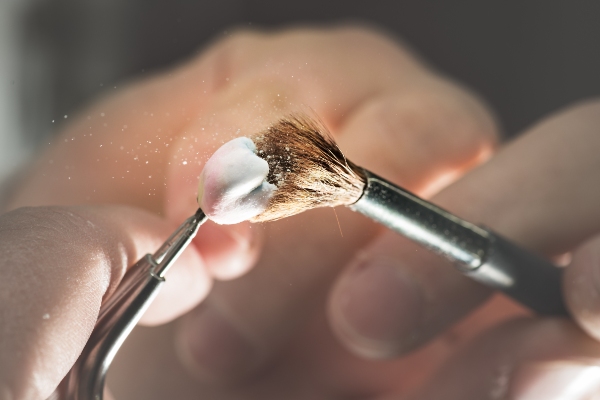A porcelain crown is a versatile dental restoration that protects and preserves damaged, weakened, or decayed natural teeth. By encasing the visible portion of a tooth, a porcelain crown restores its function, strength, and appearance. This treatment effectively saves a natural tooth from further damage, ensuring long-term oral health and maintaining the aesthetics of your smile.
Acquiring a porcelain crown
Receiving a porcelain crown involves two visits to the dental office. During the first visit, the dentist prepares the damaged tooth by removing decay and shaping it to accommodate the crown. The dentist then takes impressions to create a custom crown that fits perfectly. While a dental lab constructs the permanent crown, the dentist places a temporary crown to protect the tooth. During the second visit, the porcelain crown is securely bonded to the tooth, completing the restoration.
Porcelain crowns protect a damaged tooth
One of the primary purposes of a porcelain crown is to protect a natural tooth. A natural tooth can become damaged due to several factors, such as disease, injury, or decay. These factors significantly weaken the overall structure of the tooth. Once a dentist can remove the initial threat of the tooth degrading even more than it already has, they will need to protect it with the porcelain crown to prevent it from becoming damaged further from biting and external forces.
Porcelain crowns preserve natural tooth structure
A porcelain crown protects the tooth from further damage, preserves its natural structure, and prevents bacteria from exposure. It allows preservation by covering and supporting the existing tooth rather than extracting. Keeping the natural tooth intact is beneficial for oral health, as it maintains the integrity of the jawbone and surrounding teeth. Without a crown, the remaining structure will be exposed to forces and bacteria and be left worse than the original damage.
Porcelain crowns restore oral function
A damaged tooth can make eating or speaking difficult, especially if it causes pain or sensitivity. A porcelain crown restores the tooth's shape and function, allowing patients to chew and speak with ease. Porcelain crowns contain durable materials that can withstand normal biting and chewing forces. Moreover, they are also custom-fitted to ensure a comfortable bite, preventing further wear and tear on adjacent teeth.
Porcelain crowns offer aesthetic advantages over alternative crowns
In addition to their protective and functional benefits, porcelain crowns are praised for their aesthetic qualities. The porcelain material mimics natural teeth' color, translucency, and texture, ensuring the crown blends seamlessly with the surrounding teeth. This makes porcelain crowns ideal for restoring front teeth or other visible areas of the smile. A well-crafted porcelain crown enhances the appearance and confidence of the patient, making it a valuable investment in oral health.
Restore your smile with porcelain crowns
A porcelain crown is an effective solution for saving natural teeth damaged or at risk of further harm. Consulting with a general dentist about whether a porcelain crown is the right option ensures a treatment plan tailored to individual needs, helping protect and restore your smile's natural beauty. Contact Robert S. Sykes, DDS to schedule an appointment today.
Request an appointment here: https://drsykes.com or call Robert S. Sykes, DDS at (770) 873-7241 for an appointment in our Marietta office.
Check out what others are saying about our services on Yelp: Porcelain Crown in Marietta, GA.
Related Posts
3 Ways Dental Bridges Can Restore Your Smile
A dental bridge replaces one or more missing teeth by anchoring a lifelike “pontic” to neighboring teeth or implants. This fixed option restores chewing, speech clarity, and a natural-looking smile line. By …
Is it Painful to Get a Tooth Implant?
Tooth implants have become a popular replacement option for individuals with missing teeth. Also known as dental implants, this replacement option is one that requires a semi-invasive oral surgery. The term oral …
Complications To Watch for After a Tooth Extraction
Complications after a tooth extraction are uncommon, but understanding the warning signs helps protect long-term oral health. During healing, problems such as infection, dry socket, or prolonged bleeding can occasionally develop. Knowing …
Denture Repair: What to Do When Your Partial Dentures Break
A denture repair is needed when a set of dentures becomes damaged. Damage can occur from simply dropping the appliance or even eating something too hard that may produce a crack or …






